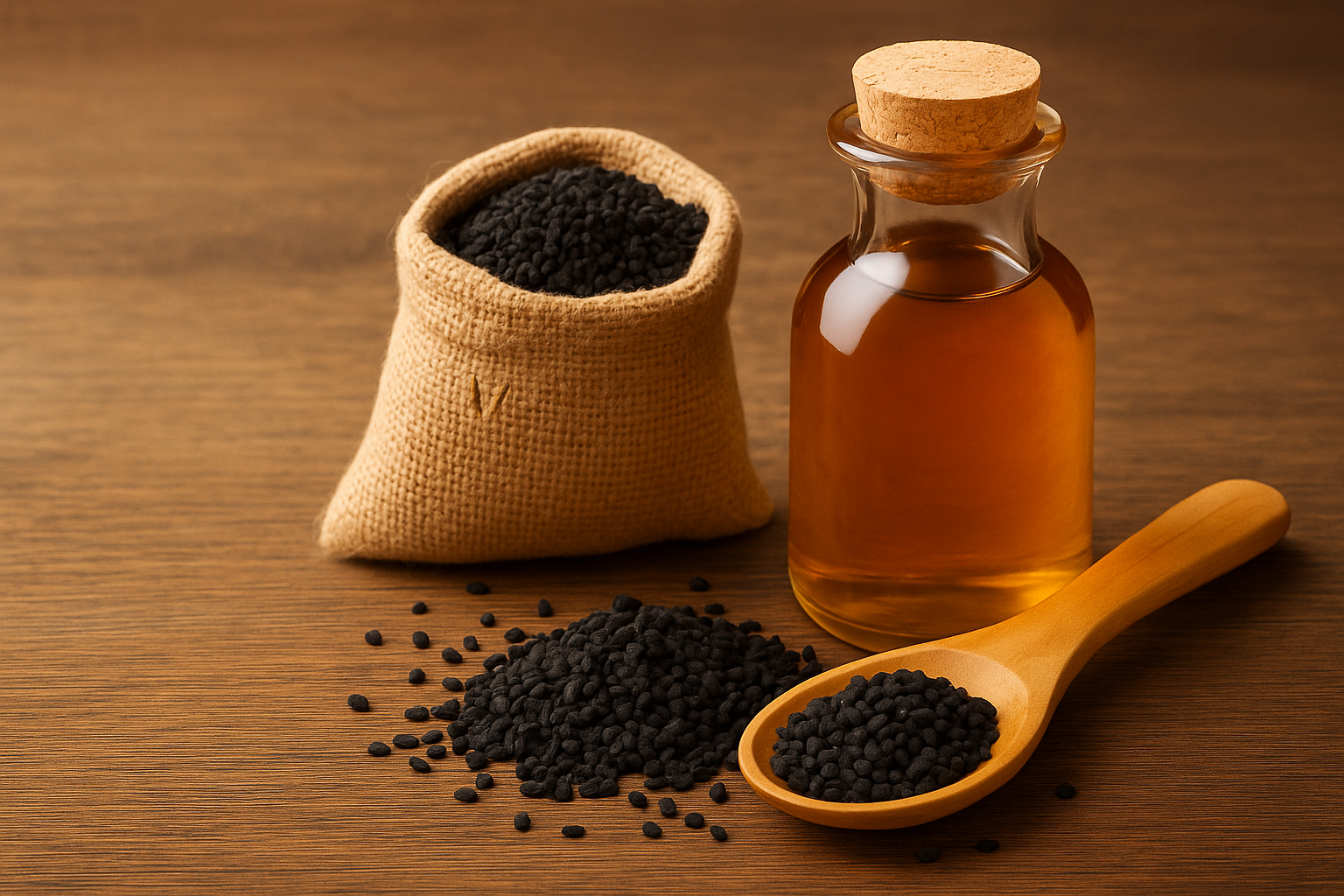
Black Cumin (Kalonji) & Black Seed Oil NZ: Unlocking Nature's Ancient Secret for Wellness
Hey there! Have you ever heard about black cumin (kalonji)? It's this tiny seed that people have valued for thousands of years across so many different cultures. From ancient Egypt to traditional Indian medicine, folks have long turned to it as a natural helper. And guess what? Right here in New Zealand, more and more health-conscious individuals are finding out just how much black seed oil NZ can truly support their everyday wellness. At Herbicare, we really believe in bringing nature's wisdom to our modern lives. For us, black seed oil truly stands out among natural health options. It's like a little piece of history, holding so much promise for a healthier you.
This guide is going to dig into what makes black cumin and its oil so special. We'll explore their fascinating background and talk about the benefits that research and tradition suggest, which may help with things like immune function, digestion, and more. We'll also share simple ways to include them in your daily routine. If you're looking for reliable, clear information on natural ways to support your family's health, and you care about where your products come from, you're absolutely in the right spot. Personally, I've always been drawn to natural remedies. Learning about the history behind something as simple as a seed often deepens my appreciation for its possibilities, connecting me to a healing tradition that spans centuries.
What are Black Cumin (Kalonji) and Black Seed Oil?
Before we chat about its many good points, let's just clear up what black cumin actually is. You might hear it called kalonji, Nigella Sativa, or simply "black seed." It's an annual plant that gives us these small, dark, fragrant seeds. These tiny seeds are where all the goodness begins.

A Rich History Rooted in Tradition
Black cumin's story is incredibly rich and old, just like its potential health benefits. For thousands of years, it has played a significant part in traditional health practices all over the world:
-
Ancient Egypt: People even found black cumin seeds in King Tut's tomb, showing their historical importance [1]. That really tells you how much they valued them, right?
-
Ayurvedic Medicine: In traditional Indian medicine, kalonji has been traditionally used to help with many different issues, from tummy upset to breathing difficulties [2].
-
Islamic Medicine: Prophet Muhammad famously said, "Hold on to the black seed, for it has a cure for every illness except death" [3].
-
Traditional Chinese Medicine (TCM): While not as widely used as in other systems, some TCM practices have also utilized similar seeds for their warming qualities.
Its long history in so many healing traditions clearly indicates how effective and safe people have considered it over time. It's truly inspiring how a plant used thousands of years ago is still relevant today. It just shows nature's enduring wisdom, a wisdom we can still tap into.
From Seed to Oil: How We Make It
While you can definitely use the seeds themselves in cooking, black seed oil is where you find the helpful compounds in a more concentrated form. We usually make the best black seed oil through a method called cold-pressing. This just means we press the seeds without using any heat or harsh chemicals. Why does this matter? Well, heat can potentially harm the delicate, beneficial components in the seeds, especially a compound called thymoquinone (TQ). Cold-pressing aims to ensure the oil keeps its nutrients, natural oils, and, most importantly, its powerful thymoquinone, potentially offering you better results [4]. Think of it like freshly squeezed orange juice versus juice from concentrate – the fresh, cold-pressed version just seems to have more genuine goodness, more vitality.
The Science-Backed Potential of Black Cumin (Kalonji) and Black Seed Oil
Black cumin's long use isn't just old stories anymore; modern science is increasingly exploring and backing its potential health benefits. The main compound, thymoquinone (TQ), appears to play a big part in black seed oil's properties that may promote well-being. It seems to work together with other beneficial fats, vitamins, and minerals.

Supporting a Strong Immune System
Today, having a strong immune system feels more important than ever. Black seed oil is gaining a lot of attention for its ability to potentially help your body's natural defenses. Research, including recent studies, suggests that thymoquinone and other parts of Nigella Sativa may contribute to better immune system function [5]. This might help your body:
-
Support Immune Cell Activity: It may promote the activity of various immune cells, like T-cells, which are key for maintaining your body's defenses.
-
Encourage a Healthy Immune Response: It may help the immune system react appropriately to challenges, potentially providing the kind of immune support NZ families are actively seeking. Especially during winter months or when the kids bring home every sniffle from school, having this extra immune support could make a real difference to my daily life. It helps me feel a bit more prepared, more resilient.
Natural Anti-Inflammatory Properties
Ongoing inflammation can be a factor in many health concerns today. Black seed oil is recognized for its anti-inflammatory properties. This is largely because thymoquinone may assist in calming inflammatory pathways in the body [6]. This suggests it could be a valuable natural aid for:
-
Promoting Joint Comfort: It may help to ease general aches and stiffness, encouraging more comfortable movement.
-
Supporting Overall Well-being: It may assist in keeping inflammation in check throughout different body systems. Imagine feeling a bit more ease in your everyday movements.
Aiding Healthy Digestion & a Happy Gut
Traditional medicine often used kalonji for stomach issues. Modern understanding also supports its potential positive effects on gut health. Black seed oil is recognized for qualities that may aid digestion, which could:
-
Help Reduce Bloating and Gas: Potentially making digestion more comfortable.
-
Support a Balanced Gut: While research is ongoing, its potential benefits for gut bacteria might contribute to a balanced gut environment, which is important for overall health [7]. A happy gut often seems to lead to a happier you!
- Promote Nutrient Absorption: A well-functioning gut may better absorb the important nutrients from your food. I have personally noticed how much more comfortable my digestion feels when I regularly include natural aids like this in my diet. It’s a subtle shift, but it adds up.
Traditionally Used for Breathing Support
Historically, black cumin has been a common traditional remedy for breathing concerns, especially those linked to inflammation. It's thought to potentially help open airways, which may:
-
Support Easier Breathing: This may be beneficial for people who experience seasonal sniffles or general breathing discomfort [8]. Just a little easier to take a deep breath.
-
Aid Nasal Clearance: Potentially helping to open up airways.
Beyond the Basics: Other Areas of Potential Support
Black seed extract offers many potential uses beyond these main areas. Newer research, though often preliminary, suggests possible benefits in other interesting areas:
-
Skin and Hair Support: Its antioxidant properties and qualities that may soothe inflammation could contribute to clearer skin and stronger hair when you use it topically or take it internally [9]. Who doesn't want to glow from the inside out?
-
Cardiovascular Support: Some studies indicate it may help maintain healthy blood pressure and cholesterol levels that are already in a normal range [10].
-
Blood Sugar Balance: Early research points to a role in helping maintain healthy blood sugar levels for those already within the normal range [11].
-
Brain Function: Its antioxidant qualities may help protect brain cells and potentially contribute to mental clarity [12]. A little mental sharpness never hurts, right?
It's important to remember that while these benefits are promising and rooted in both traditional use and scientific exploration, black seed oil is a supplement. It is not intended to diagnose, treat, cure, or prevent any disease, and it's not a replacement for professional medical advice or treatment. Always talk to a healthcare professional about any health concerns. Think of it as an extra helper, part of a holistic approach to your well-being. Your health journey is precious, so always seek expert advice.
Why Choose Herbicare Black Seed Oil in New Zealand?
When you choose products for your health, quality is important. For health-aware people in New Zealand, Herbicare is committed to offering natural supplements you can trust. We want you to feel good about what you're putting into your body.
How We Source Our Products and Ensure Quality
At Herbicare, we truly understand your concerns about product quality and where things come from. That is why we carefully pick our black seed oil to make sure it meets high standards. Our oil is:
-
Pure and Potent: We make it from top-quality Nigella Sativa seeds.
-
Cold-Pressed: We use this method to help retain all the beneficial components, especially the valuable thymoquinone.
-
Carefully Tested: We believe in being open with you. We make sure our products are thoroughly tested for purity and potency, so you can feel confident about what you are taking. Knowing how a product is made and tested gives me peace of mind, especially when choosing something for my family. That reassurance means a lot.
Supporting Your NZ Health Journey
We're proud to be a part of the natural health community here in New Zealand. We really get what our local customers need and prefer. When you pick Herbicare for your black seed oil NZ needs, you choose a brand that:
-
Makes it Easy to Buy Locally: We make it simple to buy pure black seed oil in New Zealand, with reliable shipping right to your door.
-
Connects with Kiwis: We are dedicated to helping New Zealanders explore natural, whole-body health solutions. We're here for you.
-
Stands for Quality: We are dedicated to bringing you the best nature has to offer. No compromises. We wouldn't offer anything less.
How to Use Black Seed Oil and Kalonji Every Day
Adding black seed oil and kalonji to your daily routine is simple and flexible. Whether you prefer the oil or the seeds, there are many ways to incorporate their potential benefits. It's about finding what works for your life.
Suggested Use and How to Take It
For black seed oil, a common suggested amount for adults is usually 1-2 teaspoons daily. You can take it straight or mix it with honey, juice, or a smoothie. You can have it in the morning or split it up during the day. If you prefer something easy, black seed oil capsules are also available.
For kalonji seeds, you can easily use them as a spice in your cooking.
Like with any supplement, it's best to start with a smaller amount and gradually increase it. And remember, if you have any health conditions or are taking medicine, please talk to your doctor before adding black seed oil or any new supplement to your routine. This advice is especially important for pregnant or breastfeeding people, or those taking blood thinners. It's always best to be safe and chat with a professional! Your health journey is unique, and personalized advice is key.
Cooking with Kalonji Seeds
Kalonji seeds (black cumin seeds) are a great addition to your kitchen. They offer a unique, slightly strong and nutty taste. Get creative!
-
Baking: Sprinkle them on bread, naan, bagels, or crackers before baking for a fragrant crunch. So simple, so tasty.
-
Curries & Stews: They are a common ingredient in Indian and Middle Eastern cooking, adding richness to curries, lentil dishes, and vegetable meals.
-
Salad Topping: Lightly toast them and scatter over salads for extra flavor and texture. A little something extra.
-
Pickles & Chutneys: Incorporate them into your homemade pickles and chutneys for an extra layer of taste.
Using Black Seed Oil for Skin and Hair Support
Black seed oil's beneficial qualities aren't just for taking by mouth. Its properties that may combat oxidative stress and soothe inflammation make it a good option for skin and hair:
-
Skin Care: Mix a few drops with your preferred moisturizer or a carrier oil (like jojoba or almond oil) and apply it to help soothe irritated skin, reduce redness, or simply provide deep moisture. Give your skin a little extra care.
-
Hair Health: Gently rub a small amount into your scalp to help your hair be strong and shiny. You can also add it to your regular shampoos or conditioners. A friend of mine uses a few drops of black seed oil in her conditioner for added shine – it's a simple trick that can make a difference. Why not try it?
Possible Side Effects and Things to Watch Out For
While black seed oil generally appears safe for most people when they use it in suggested amounts, it is important to be aware of possible considerations. We want you to feel secure and informed.
Who Should Be Careful?
-
Pregnancy and Breastfeeding: If you're pregnant or breastfeeding, please talk to your doctor before using black seed oil. There isn't extensive research for these situations, and your doctor knows best.
-
Blood-Thinning Medicines: Black seed oil might have a mild blood-thinning effect, so if you're taking blood thinners, use it carefully and under your doctor's guidance.
-
Diabetes Medicines: It might influence blood sugar levels, so if you're managing diabetes with medicine, check your sugar levels closely.
-
Low Blood Pressure: If you naturally have low blood pressure, use it carefully, as it might slightly lower blood pressure further.
Always listen to your body and stop using it if you feel any reactions. When in doubt, talking to a healthcare professional is always the smartest thing to do. Better safe than sorry! Your peace of mind matters most.
Common Questions (FAQs)
As you learn about black cumin and black seed oil, you might have some common questions. We're here to help clear things up. Consider these insights from our community!
Is black cumin the same as black seed?
Yes, black cumin and black seed (or black seed oil) refer to the same plant, Nigella sativa. People often use the names interchangeably. So, you're talking about the same amazing plant!
What is the difference between black cumin seeds and black seed oil?
Black cumin seeds are the whole seeds from the Nigella sativa plant. People often use them as a spice or in traditional remedies. Black seed oil is the concentrated oil extracted from these seeds, which contains higher levels of the beneficial components, especially thymoquinone. It's just a more potent way to get those potential benefits.
How long does it take to see results from black seed oil?
How long it takes to feel benefits can differ greatly for each person. It depends on factors like how much you use, how consistently you use it, your individual body, and what health aspect you are aiming to support. Some people might notice changes in a few weeks, while for others, it might take longer, or the benefits might be subtle. Regular, consistent use is generally key. From my own experience with various supplements, consistency really is the secret to seeing lasting results. Just stick with it! Your body needs time to respond and adapt.
Can children take black seed oil?
While some traditional practices have used it for children, it is important to talk to a pediatrician or healthcare professional before giving black seed oil or any new supplement to kids. Appropriate dosage and safety can differ quite a bit for younger individuals. Always put their safety first!
Are there any New Zealand rules for black seed oil?
In New Zealand, black seed oil generally falls under the category of a food supplement. Like all supplements, it must adhere to general food safety rules and labeling requirements set by organizations like the Ministry for Primary Industries (MPI) [13]. Herbicare makes sure all our products follow these strict rules, offering you a safe and good quality product. For more information, please feel free to Contact Us. We're always here to answer your questions.
Conclusion
From ancient times to modern health routines in New Zealand, black cumin (kalonji) and its potent black seed oil have truly endured. Their array of potential benefits, supported by both traditional wisdom and scientific exploration, and largely attributed to the powerful compound thymoquinone, make them a gift from nature. It's a reminder of how much wisdom lies in the natural world. Whether you look to support your immune system, aid your digestion, or simply promote overall well-being, black seed oil offers a natural and holistic way to enhance your health. It's about empowering yourself with choices that nurture your well-being.
At Herbicare, we passionately commit to bringing the best of nature's pantry directly to you. Our top-quality black seed oil is carefully sourced and cold-pressed to help ensure you get a potent and high-quality product for your health journey. We truly stand by our products because we believe in their potential.
Ready to explore the potential of black seed oil for yourself? Take that step! Explore Herbicare's premium Black Seed Oil range today and start your journey toward natural wellness! You might also be interested in our guide on "Boosting Your Immune System Naturally" for more tips. What small, nurturing step will you take for your health today?
Citations / References:
[1] Zohary, D., Hopf, M., & Weiss, E. (2012). Domestication of Plants in the Old World: The Origin and Spread of Cultivated Plants in West Asia, Europe, and the Nile Valley. Oxford University Press. (General reference for historical plant use in ancient civilizations).
[2] Ahmad, A., et al. (2013). "Nigella sativa (Black cumin): A comprehensive review on its chemical constituents and pharmacological properties." Asian Pacific Journal of Tropical Biomedicine, 3(10), 964-978.
[3] Sahih al-Bukhari. Book 76, Hadith 5687. (Accessed via reputable Hadith collections online, e.g., Sunnah.com).
[4] Ramadan, M. F., & Mörsel, J. T. (2002). "The effect of extraction methods on the chemical composition and antioxidant activity of Nigella sativa L. seed oil." Journal of the American Oil Chemists' Society, 79(9), 897-903.
[5] Majdalawieh, A. F., & Fayyad, M. W. (2015). "Immunomodulatory and anti-inflammatory effects of Nigella sativa and its main constituent thymoquinone: A comprehensive review." European Journal of Pharmacology, 761, 268-274.
[6] Gali-Muhtasib, H., et al. (2006). "Thymoquinone: a promising natural compound with potential benefits for immune regulation." International Immunopharmacology, 6(11), 1286-1296.
[7] Tavakkolifar, H., et al. (2020). "Nigella sativa and its active constituents on gut health: A systematic review." Journal of Functional Foods, 69, 103953.
[8] Boskabady, M. H., et al. (2013). "Bronchodilatory and anti-tussive effects of Nigella sativa L. seed extract and its main constituent thymoquinone on asthmatic patients." Pharmacology & Pharmacy, 4(1), 1-8.
[9] Akbari, A., et al. (2020). "Nigella sativa (Black Seed) and Its Active Constituent Thymoquinone in the Management of Skin Disorders." Current Opinion in Pharmacology, 55, 126-133.
[10] Namazi, N., et al. (2015). "Hypotensive and hypolipidemic effects of Nigella sativa L. in obese women: a randomized controlled trial." Journal of Functional Foods, 17, 720-727.
[11] Bamosa, A. O., et al. (2010). "The effects of Nigella sativa L. on blood glucose, lipid profile, and body weight in patients with type 2 diabetes mellitus." Journal of Clinical Lipidology, 4(5), 416-419.
[12] Abulfadl, Y. S., et al. (2018). "Neuroprotective effects of thymoquinone, the main active ingredient of Nigella sativa, on neurodegenerative diseases." Journal of Pharmacopuncture, 21(3), 159-166.
[13] New Zealand Ministry for Primary Industries (MPI) - Food Act 2014. (General reference to NZ food regulatory framework; specific direct link to supplement guidelines within MPI's vast resources might vary, but this refers to the governing body).









Leave a comment
This site is protected by hCaptcha and the hCaptcha Privacy Policy and Terms of Service apply.